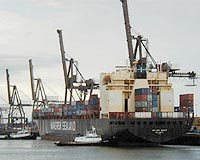| . |  |
. |
Kathmandu (AFP) Nov 28, 2009 Nepal's cabinet will meet in the shadow of Mount Everest next week to highlight the impact of global warming on the Himalayas ahead of UN climate talks in Copenhagen, officials said Saturday. Twenty-six ministers, together with staff, will travel to the town of Gorakshep, high up in the foothills of Everest, for the special climate-themed meeting, said Bishnu Rijal, press advisor to Prime Minister Madhav Kumar Nepal. "We're going to host a ministerial level cabinet meeting on Friday, December 4 at Gorakshep to draw the attention of the whole world" to the effects of global warming on the Himalayas, he told AFP. "Our glaciers are melting and glacial lakes are growing and are on the verge of overflowing. That will create a Himalayan tsunami. Even though we do not contribute to global warming, our country is highly vulnerable." The UN talks, aimed at setting targets to curb greenhouse gases blamed for global warming, take place December 7-18. Gorakshep, a sandy plateau 5,165 metres (17,000 feet) above sea level, is the last village before the Everest base camp and the place from where mountaineers seeking to climb the celebrated peak set out. Originally the cabinet planned to meet at the base camp itself, a little higher at 5,360 metres (17,585 feet). But the venue was changed as it was too difficult to get all the ministers and officials there by helicopter, Rijal said. In October the Maldives held its own publicity-grabbing underwater cabinet meeting to draw attention to rising sea levels that threaten to submerge the island nation. Around 1.3 billion people depend on the water that flows from the Himalayan glaciers, which experts say are melting at an alarming rate, threatening to bring floods and later drought to Nepal, India and Pakistan. Campaigners say that while the effects of climate change on low-lying South Asian countries such as Bangladesh and the Maldives are now well known, there is little international awareness of the vulnerability of the Himalayan region. "Our motive is to draw the attention of global leaders to commit and work towards lowering the greenhouse gas emissions and also provide compensation mechanisms to vulnerable countries like us," said Rijal. "The Western countries should also think about preventive measures for country like ours where people live under the constant threat" of climate change, he said. "Climate change has hit the Himalayas in general and Nepal in particular."
Share This Article With Planet Earth
Related Links Beyond the Ice Age
 Melting icecaps to cause massive damage in port cities: WWF
Melting icecaps to cause massive damage in port cities: WWFGeneva (AFP) Nov 23, 2009 Flooding in the world's major port cities caused by melting icecaps could cause up to 28 trillion dollars (18 trillion euros) in damage in 2050, environmental group WWF said in a report Monday. "If the temperature rises between 0.5 and 2 degrees (Celsius) between now and 2050, it's possible that the sea level would progress by half a metre (nearly two feet) bringing major financial damage," ... read more |
|
| The content herein, unless otherwise known to be public domain, are Copyright 1995-2009 - SpaceDaily. AFP and UPI Wire Stories are copyright Agence France-Presse and United Press International. ESA Portal Reports are copyright European Space Agency. All NASA sourced material is public domain. Additional copyrights may apply in whole or part to other bona fide parties. Advertising does not imply endorsement,agreement or approval of any opinions, statements or information provided by SpaceDaily on any Web page published or hosted by SpaceDaily. Privacy Statement |